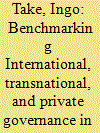|
|
|
Sort Order |
|
|
|
Items / Page
|
|
|
|
|
|
|
| Srl | Item |
| 1 |
ID:
120823


|
|
|
|
|
| Publication |
2013.
|
| Summary/Abstract |
The question of how to overcome the democratic deficits of global forms of governance has led to a pretentious academic debate. To proceed in theory-building, we need to assign systematically the theory-driven assumptions on legitimate forms of governance beyond the nation-state with the various, already observable forms of global governance. Thereto, the paper is aiming at a systematic comparative appraisal of the legitimatory quality of different patterns of governance by applying suitable indicators for their measurement. The innovative potential of this paper is the application of a structured, focused comparison that interconnects a multi-dimensional concept of legitimacy (input-, throughput- and outputdimension) with the triad of international, transnational and private forms of governance. As far as the chosen indicators show a legitimizing effect, they should serve as a standard for upcoming research studies and, by this, contribute to further systematization of studies on global governance. At least, the analysis of the constitutive criteria of cross-border governance arrangements in a legitimacy-based theoretical perspective shall also help to identify their discrete potential for legitimacy and indicate ways for their institutional safeguard and transformation to other arrangements. The conceptual outline will be completed by a case study on forest governance.
|
|
|
|
|
|
|
|
|
|
|
|
|
|
|
|
| 2 |
ID:
120825


|
|
|
|
|
| Publication |
2013.
|
| Summary/Abstract |
The Ill-Treatment and Torture (ITT) Data Collection Project uses content analysis to measure allegations of government ill-treatment and torture made by Amnesty International (AI) from 1995 to 2005. ITT's country-year (CY) data quantify AI allegations of ill-treatment and torture at the country-year unit of observation and further across different responsible government agents and across different econo-socio-political groups of alleged victims. This paper introduces the Ill-Treatment and Torture country-year data, describes quantitative patterns likely to be of interest to researchers focused on the study of international non-governmental organizations (INGOs) and human rights, and suggests a number of theoretically motivated questions that can be explored using the ITT country-year data.
|
|
|
|
|
|
|
|
|
|
|
|
|
|
|
|
| 3 |
ID:
120824


|
|
|
|
|
| Publication |
2013.
|
| Summary/Abstract |
Will a strategy change toward one of "hearts and minds" alter the eventual outcome of the American-led allied war effort in Afghanistan? We investigate this question by analyzing 66 cases of counterinsurgency warfare from the twentieth century in which a foreign power seeks to defend a central authority in a state or colonial territory against an insurgency. We identify whether and when a foreign power implemented a change in its counterinsurgency strategy, whether said change involved a shift toward a strategy reflecting a hearts and minds emphasis, as well as the foreign power's eventual success or failure in prevailing over insurgents. We find that while shifting toward a strategy of hearts and minds increases the chances for success, the improvement is modest and requires nearly a decade to produce. Furthermore, we find that the impact of a strategy change is conditional on the timing of the change, with a "window of opportunity" associated with success closing after approximately eight years of war. Our findings bode poorly for allied efforts in contemporary Afghanistan.
|
|
|
|
|
|
|
|
|
|
|
|
|
|
|
|
| 4 |
ID:
120821


|
|
|
|
|
| Publication |
2013.
|
| Summary/Abstract |
Classroom simulations are a well-known tool in learner-centered education, and in the field of international relations, simulations have been utilized for years to stimulate student learning. The literature has shown that simulations encourage active learning and retention of information; however, there are challenges with conducting simulations online, and the tool has been relatively underdeveloped. While there are commercial online simulations, there has been less research on the effectiveness of various approaches, particularly in classes that are completely online, with simulations entirely designed and implemented by faculty. This paper reviews some of the literature on simulations, hybrid and online, creates a design framework from the literature and analyzes a simulation implemented in an online mixed graduate/undergraduate regional studies political science class. Results showed positive learning and feedback from the students; however, several features will be changed in the simulation design to improve future simulations. Further, suggestions will be offered on how this type of simulation can be tailored for different courses.
|
|
|
|
|
|
|
|
|
|
|
|
|
|
|
|
| 5 |
ID:
120822


|
|
|
|
|
| Publication |
2013.
|
| Summary/Abstract |
While global politics simulations have great potential to produce deeper learning of international affairs and IR theories and to promote the further development of technical skills, there are a variety of simulations to choose from, each with its own advantages and disadvantages for student learning. This paper engages in a comparative analysis of five distinct simulation types to examine the ways in which structural differences grant instructors more or less control over the learning environment. The five simulation types are the following: credit- and noncredit-bearing Model United Nations activities, hybrid Model UN activities, extended-in class simulations of real global actors and problems, and extended in-class simulations of fabricated global systems. The paper then considers the distinct opportunities for content, experiential, and theoretical learning within each simulation type.
|
|
|
|
|
|
|
|
|
|
|
|
|
|
|
|
| 6 |
ID:
120826


|
|
|
|
|
| Publication |
2013.
|
| Summary/Abstract |
In the contemporary world also, the academic community is faced with increasing calls for being useful and relevant. But what is the actual space for academic expertise and policy analysis in the making of foreign policy? How do the two coincide and coexist temporally? The article takes its starting point the work of Robert Cox and Fred Chernoff to debate the issue of policy-relevant knowledge and theory. In addition, the article seeks to analyze the spatial and temporal aspects of providing scholarly analysis in the actual making of policy. Drawing from this, the article concludes by sketching out three strategies, or roles, a scholar may apply in trying to get the message across different audience groups and in different contingencies.
|
|
|
|
|
|
|
|
|
|
|
|
|
|
|
|
| 7 |
ID:
120820


|
|
|
|
|
| Publication |
2013.
|
| Summary/Abstract |
This paper presents the case of a role-play simulation that recreates a recent negotiation of the Convention on Biological Diversity. Using a blended learning approach, our simulated negotiation integrates three educational delivery methods-preparatory learning, face-to-face learning, and online collaborative learning-to recreate the complexity of negotiating global environmental issues. Qualitative student feedback is used to analyze the benefits and challenges of this approach. Our results suggest that blending learning methods within a role-play simulation is an effective strategy to help students appreciate the challenge of achieving consensus among competing interests, understand the pervasive power dynamics that shape political outcomes within the realm of global environmental governance, and hone skills relevant to policy analysis, negotiation, and consensus building.
|
|
|
|
|
|
|
|
|
|
|
|
|
|
|
|
|
|
|
|
|